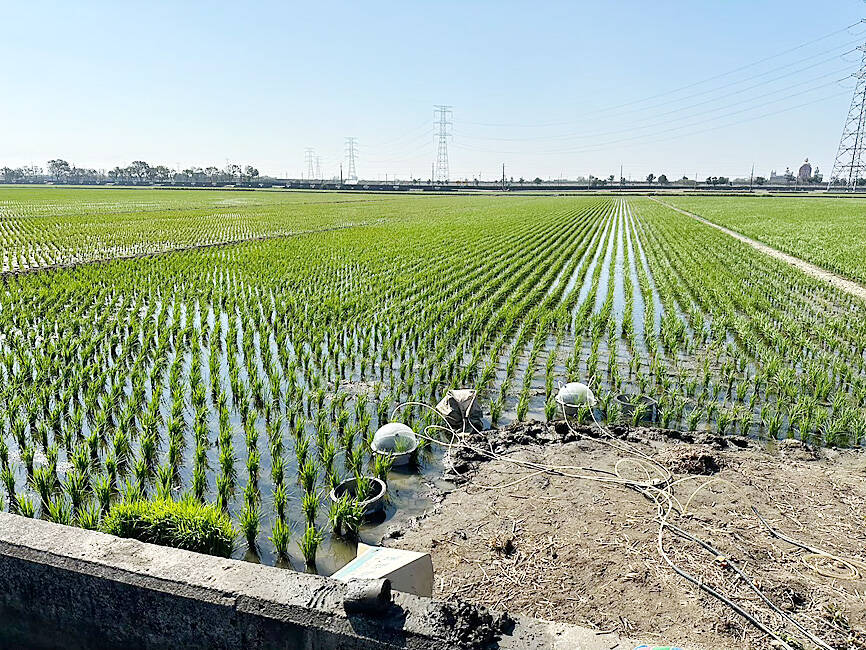Exports of rice from Taiwan to Japan have been increasing in the past few years, and this year it would supply the Japan Self-Defense Forces for the first time, Deputy Minister of Agriculture Hu Jong-i (胡忠一) said on Friday.
Japan has been promoting the consumption of rice in the past few years, increasing demand for the grain.
However, the country is facing a shortage, as rice farmers have struggled to earn a sufficient income amid low prices, while high temperatures have led to poor harvests. Additionally, rural communities lack enough agricultural workers to succeed aging rice farmers.

Photo courtesy of the Yunlin County Government
Hu, who is leading a delegation of Taiwanese rice industry representatives on a visit to Japan, said that as the qualities and types of rice grown in Taiwan are similar to those in Japan, Taiwan has been expanding its rice exports to its eastern neighbor.
Taiwanese rice exporter Okura Enterprise Co, Japanese food importer Kitanihontusho Co, and catering food service companies Nihon Eiyo Shokuhin Corp and Nisso Corp have cooperated to establish a model to supply Taiwanese rice to Japanese group meal services companies, he said.
Taiwanese rice has previously been supplied to Japanese restaurants, Hu said, adding that this year it has for the first time been supplied for meals in Japanese hospitals, elderly care institutions, school lunches and the Japan Self-Defense Forces.
Such institutions have higher standards for the safety and quality of their food ingredients, so being accepted by them means Taiwan’s rice meets their requirements for texture and quality, he said.
With Japan facing a shortage of rice and local rice prices rising, it is good timing for Taiwan’s rice to enter the Japanese market, he said.
To protect its domestic rice industry, Japan has implemented tariff rate quotas under the WTO framework, Hu said, adding that Taiwan’s rice received a quota of 3,000 tonnes, and if rice exports exceeds that quota, a tariff of ¥341 (US$2.38) per kilogram of rice would be imposed, which costs more than the rice itself.
Therefore only 3,000 tonnes of Taiwan rice, mainly the Tainan No. 11 rice, are planned to be exported to Japan this year, and hopefully Taiwan’s rice exports can be expanded further in Japan, allowing Taiwan to not only be the country’s important international ally, but also an important rice supplier, he said.

SHIPS, TRAINS AND AUTOMOBILES: The ministry has announced changes to varied transportation industries taking effect soon, with a number of effects for passengers Beginning next month, the post office is canceling signature upon delivery and written inquiry services for international registered small packets in accordance with the new policy of the Universal Postal Union, the Ministry of Transportation and Communications said yesterday. The new policy does not apply to packets that are to be delivered to China, the ministry said. Senders of international registered small packets would receive a NT$10 rebate on postage if the packets are sent from Jan. 1 to March 31, it added. The ministry said that three other policies are also scheduled to take effect next month. International cruise ship operators

HORROR STORIES: One victim recounted not realizing they had been stabbed and seeing people bleeding, while another recalled breaking down in tears after fleeing A man on Friday died after he tried to fight the knife-wielding suspect who went on a stabbing spree near two of Taipei’s busiest metro stations, Taipei Mayor Chiang Wan-an (蔣萬安) said. The 57-year-old man, identified by his family name, Yu (余), encountered the suspect at Exit M7 of Taipei Main Station and immediately tried to stop him, but was fatally wounded and later died, Chiang said, calling the incident “heartbreaking.” Yu’s family would receive at least NT$5 million (US$158,584) in compensation through the Taipei Rapid Transit Corp’s (TRTC) insurance coverage, he said after convening an emergency security response meeting yesterday morning. National

The Forestry and Nature Conservation Agency yesterday launched a gift box to market honey “certified by a Formosan black bear” in appreciation of a beekeeper’s amicable interaction with a honey-thieving bear. Beekeeper Chih Ming-chen (池明鎮) in January inspected his bee farm in Hualien County’s Jhuosi Township (卓溪) and found that more than 20 beehives had been destroyed and many hives were eaten, with bear droppings and paw prints near the destroyed hives, the agency said. Chih returned to the farm to move the remaining beehives away that evening when he encountered a Formosan black bear only 20m away, the agency said. The bear

PLANNED: The suspect visited the crime scene before the killings, seeking information on how to access the roof, and had extensively researched a 2014 stabbing incident The suspect in a stabbing attack that killed three people and injured 11 in Taipei on Friday had planned the assault and set fires at other locations earlier in the day, law enforcement officials said yesterday. National Police Agency (NPA) Director-General Chang Jung-hsin (張榮興) said the suspect, a 27-year-old man named Chang Wen (張文), began the attacks at 3:40pm, first setting off smoke bombs on a road, damaging cars and motorbikes. Earlier, Chang Wen set fire to a rental room where he was staying on Gongyuan Road in Zhongzheng District (中正), Chang Jung-hsin said. The suspect later threw smoke grenades near two exits